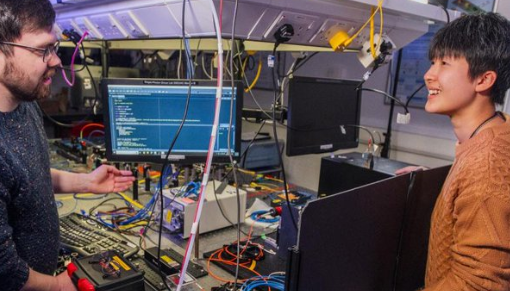Heriot-Watt University has been chosen to lead a groundbreaking new quantum research hub that aims to develop technologies to progress an ultra-secure ‘quantum internet’ of the future. The Integrated Quantum Networks (IQN) Hub is one of five new quantum technology hubs announced by the UK government as part of a £160 million investment to ensure the UK remains at the forefront of these revolutionary technologies.
Interesting news this morning. Heriot-Watt University in Edinburgh has been chosen to lead a ‘groundbreaking’ new quantum research hub. https://t.co/XxczAsZTRx
— Neal Michie (@nealmichie) July 30, 2024
Quantum technology can harness the unique properties of atoms and subatomic particles to achieve functionalities that are not possible with existing, conventional technologies. While complex in nature, the applications of quantum technology are set to revolutionize many aspects of our daily lives.
Professor Gerald Buller, who will lead the IQN Hub at Heriot-Watt, explains: “Think of quantum like a supercharged version of the technology we use today. It allows us to solve problems and secure data in ways that are unimaginable with conventional technology. This could lead to breakthroughs in everything from pharmaceutical research to exciting new materials development.”
The IQN Hub will focus on creating large-scale quantum networks capable of distributing quantum entanglement potentially leading to the development of a secure communications network and therefore an internet free from hacking issues. Another clear motivation for quantum networks is to connect next-generation quantum processors to produce enormous computational power. Furthermore, these quantum networks can eventually be used to connect quantum sensors for ultra-low-noise measurements.
“The Integrated Quantum Networks Hub will deliver the research required towards the establishment of a quantum internet, leading to metropolitan scale demonstrations within the lifetime of the Hub,” said Professor Buller. “The Hub harnesses the excellent research done over the last ten years in the National Quantum Technologies Programme to focus on delivering quantum networks at a range of distance scales, from local networks up to global satellite-based connections.”
In an era where cybercrime costs the UK an estimated £27 billion annually, the quantum internet promises unprecedented levels of security. Unlike current encryption methods, quantum networks use the principles of quantum mechanics to create unbreakable encryption keys, making them impervious to hacking attempts.
NewsPicks AI: Groundbreaking New Research Hub Aims To Develop “Near-Unhackable” Quantum Internet – https://t.co/C3VdPpXAXG #newspicksai #news #ainews #technologienews #globalnews #worldnews #ainews #sciencenews #cryptonews pic.twitter.com/m4xHIKOfCc
— newspicksai (@newspicksai) August 4, 2024
Beyond enhanced security, the quantum internet provides secure connections between quantum computing resources which will revolutionize fields such as healthcare, enabling accelerated drug discovery and personalized treatment plans. It could also drive advancements in artificial intelligence, environmental monitoring, and improved navigation systems.
Heriot-Watt’s involvement in quantum research extends beyond the IQN Hub, with the university also playing significant roles in three of the four other newly announced quantum hubs. These include hubs focused on quantum-enabled position, navigation and timing, quantum biomedical sensing, and quantum sensing, imaging, and timing.
Professor Gill Murray, Deputy Principal for Enterprise and Business at Heriot-Watt University, highlighted the broader implications of the announcement: “The launch of five new quantum hubs is a significant milestone for the UK and represents a major shift in data security and cutting-edge applications across all sectors. The UK has established itself as an early pioneer, aligned with the government’s national quantum strategy aiming to become a quantum-enabled economy by 2035. These hubs form a critical piece of that roadmap by tackling key research and development challenges around quantum networking, sensing, computing, and more.”
The IQN Hub brings together a network of over 40 non-academic collaborators, ranging from startups to multinational corporations, alongside organizations like the National Cyber Security Centre and Scottish Enterprise. It will receive over £20 million in partner support to help translate quantum innovations into new products and services.
Scottish university to pioneer ‘near-unhackable’ quantum internet – Yahoo News UK https://t.co/NZjrfswv7f
— Drmikemyers (@drmikemyers) July 30, 2024
The five new quantum hubs are being delivered by the UKRI Engineering and Physical Sciences Research Council (EPSRC), with a £106 million investment from EPSRC, the UKRI Biotechnology and Biological Research Council, UKRI Medical Research Council, and the National Institute for Health and Care Research. Industry collaboration is a key element, with significant cash and in-kind contributions from partners worth more than £54 million.
As the UK aims to become a quantum-enabled economy by 2035, these hubs form a critical piece of the national quantum strategy. They are expected to drive entrepreneurship, workforce development, and regulatory input into the rapidly emerging UK quantum industry, potentially sparking significant economic growth and job creation in the coming years.
key Points:
i. Quantum Research Hub Leadership: Heriot-Watt University will lead the new Integrated Quantum Networks (IQN) Hub, aiming to develop an ultra-secure quantum internet.
ii. Focus and Goals: The hub will create large-scale quantum networks for secure communications, connecting next-generation quantum processors and sensors.
iii. Enhanced Security: The quantum internet will offer unprecedented security with unbreakable encryption keys, making it impervious to hacking attempts.
iv. Broad Quantum Involvement: Heriot-Watt is also involved in three other quantum hubs focused on positioning, biomedical sensing, and imaging.
v. Industry Collaboration: The IQN Hub collaborates with over 40 non-academic partners and receives significant funding from various UK research councils and industry partners.
Lap Fu Ip – Reprinted with permission of Whatfinger News



